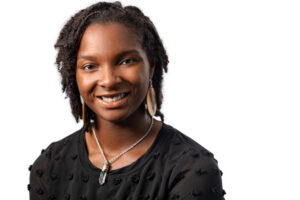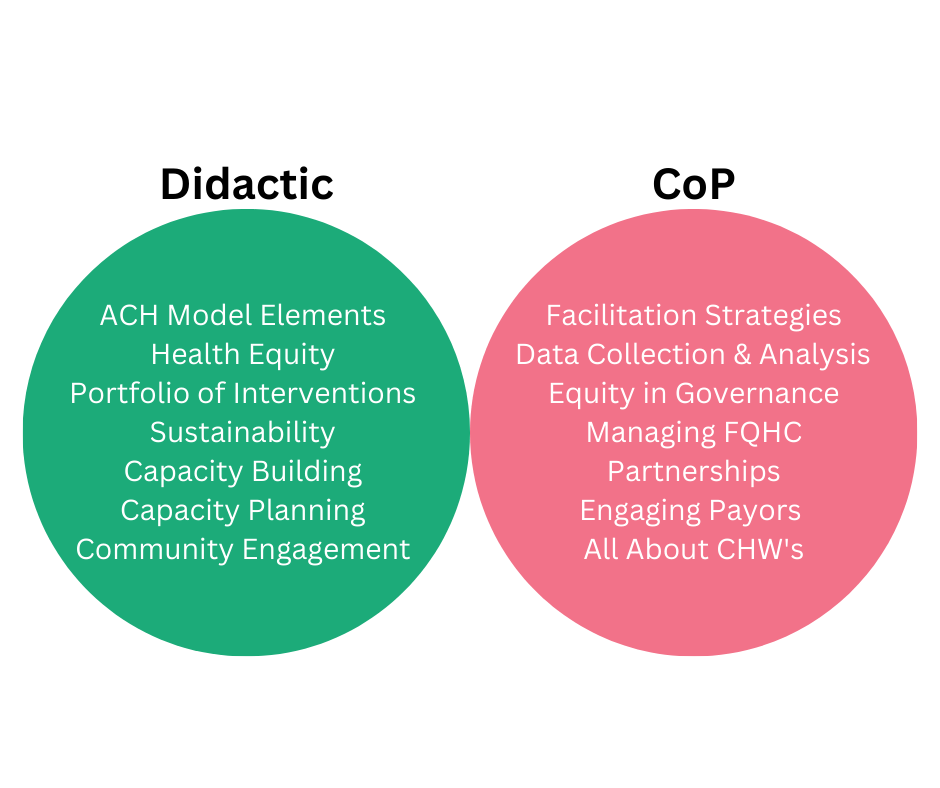
By: Briana Martin
Research and Evaluation Associate, Episcopal Health Foundation
In the establishment of the ACH model in Texas, it is essential for TACHI partners to be flexible and open-minded to make possible a successful and sustainable initiative. The commitment to transform the knowledge building and learning modalities throughout the initiative’s implementation phase exemplifies our adaptability.
As a result of formal and informal evaluations of TACHI, incorporating a range of partner voices, in 2023 we implemented a new learning framework– the Community of Practice (CoP).
The Learning Journey
Originally TACHI sites participated in “learning sessions”. Picture this as a traditional classroom: there was a highly experienced expert (i.e., the technical advisors) and the eager students (i.e., the TACHI sites) engaging in topics and learning activities planned by the expert.
This instructional style took shape with both asynchronous and synchronous “knowledge-building lectures” accompanied with homework and meetings. As with many classrooms, engagement varied amongst the sites with each having different responses to practical vs conceptual learning materials.
For anyone who has participated in this learning style, they could admit that it has its benefits and faults.
On one hand, it makes sense to listen and learn from those who have studied and/or implemented the ACH model. Causing the initial TACHI learning agenda to focus on relevant topics– the ACH framework, related policies, tips for sustainability efforts, etc.
On the other hand, the traditional expert-student relationship can undermine the learners’ individual and unique needs. For example, forming newfound cross-sector relationships requires a range of skills and sites’ needs differed- including, but not limited to, trust-building, having candid conversations, and addressing existing power dynamics at play. Nuances such as these materialized differently for each TACHI site and were not fully captured in the setting of a traditional didactic learning style.
Ultimately, TACHI partners began to realize that the ACH model is not a one size fits all nor can it be implemented in the ‘right way’—which is an idea often touted in traditional learning environments.
We began to reach the limits of the traditional learning environment. There had to be a way to center the learning interests of TACHI sites. A way that harnessed the expertise of the sites and their community partners.
Then came the CoP framework in 2023.
The CoP employs a liberating learning infrastructure. Imagine this method as on the more progressive side of the spectrum, where a group of people come together (i.e., TACHI backbones) and collectively decide what interests them and where they would like to deepen their knowledge.
To form a proper CoP, the members are responsible for developing the mechanism for learning and the cadence of the learning schedule. In early 2023, we gathered the TACHI backbones to do that and more. Aside from the inevitable networking and community-building, the group developed shared agreements and mutual expectations.
Ultimately, through this new arrangement, the members are leveraging their independent and collective expertise to drive the learning agenda and the teaching. For anyone who has participated in this learning style, they can understand the potential for creative problem-solving, collaboration, and the reimagination of who experts are.
This CoP method centers collaborating, questioning, and critical thinking. The needs of each site are at center-stage and the technical advisors (TA’s) are no longer simply teaching TACHI sites what they need to know. TACHI sites are learning what they want to know.
The Balancing Act
There was an inevitable power shift associated with the CoP framework; the sites are now steering the learning conversations and topics, as well as developing the strategies for addressing their interests, with support from the TA’s and other TACHI partners. Just as with any power shift, both sides must re-establish their footing. Sites are finding their way in setting the learning agenda and the TA’s are learning how to support without heading the knowledge building.
As one may expect, introducing the new learning style shifted the learning focus and topics. See below a comparison of the learning agendas for each style.

Viewing these learning agendas, you will notice the differences between the two. These differences not only highlight the need for both styles of learning, but also the need for TACHI partners to remain responsive within the knowledge building setting. As we explore a variety of learning methods, there are varying opinions about what should be on the learning agenda and when. Therefore, it is important to continue to find the balance between teaching the sites what they need to know and allowing sites to learn what they want to know.
An adjustment the TA’s made is to offer ad-hoc learning sessions offered to all TACHI sites. This change has allowed for a few things to take place:
- TA’s can continue to present need-to-know information;
- TACHI sites can decide amongst themselves who should attend the learning session; and
- There is an opportunity for TACHI sites to engage with a topic that may not have been on their learning agenda.